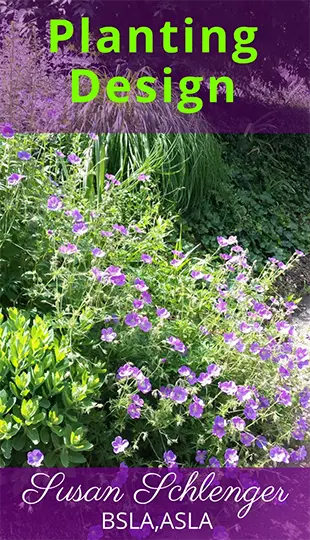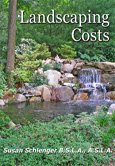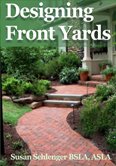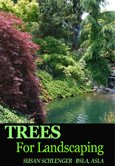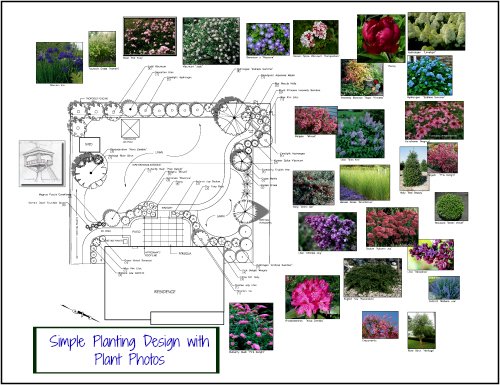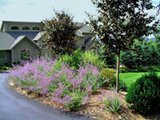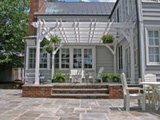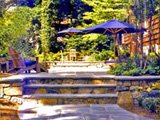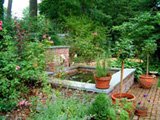Landscaping With Stone
Landscaping with stone is my first choice for hardscape projects such as retaining walls, patios and walkways. It is more expensive than other materials, but if it is within your budget, I would highly recommend it! There is nothing like natural stone.
The textures and colors are beautiful. Stone is more long lasting
than other materials...after all it has been around forever. There are
"stone-like" stamped concrete patterns and "cobblestone" tumbled
pavers. Some can be nice looking too, but they are not the real thing.
More Stone Pictures and Info
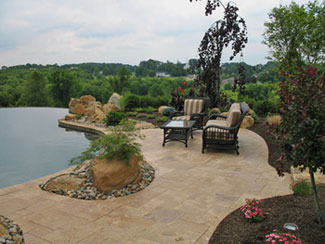
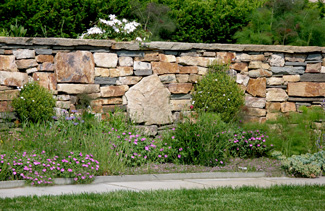
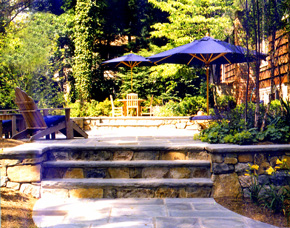
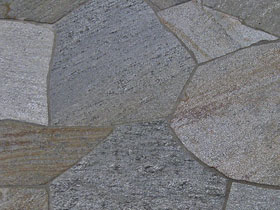
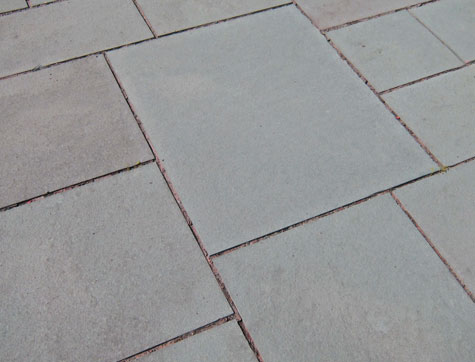
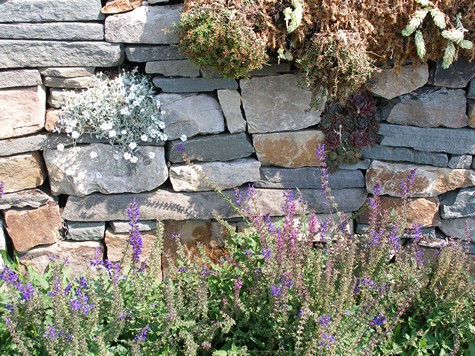
Although projects can be very nice when other paving materials are used, landscaping with stone creates a very special project.
But how do you go about choosing the garden stone and come up with good stone landscaping ideas?
Landscaping with stone is like using any other material. All surrounding landscape elements must look good with the particular stone you select. For example...
- A wall must look good with a patio.
- A patio must look good with any steps.
- Everything has to go well with your house material.
Bluestone typically looks great with other stone areas, but sometimes you may use stone for one thing and concrete, pavers, travertine or brick for another.
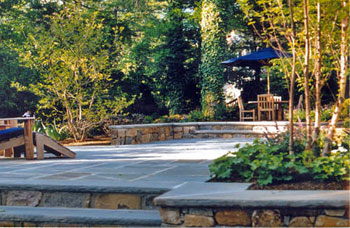
I have written about one of my projects and how I went about
coordinating the various stone in the project. You can read about my
landscaping with stone design on my page: Landscape With Natural Stone. Also visit my page on Landscape Boulders. Boulders can be used within a wall, at the ends of a wall, or even be set into a patio!
Stone Walls
There are many types of stone available. Stone types and names vary depending on what area of the country you are in. The best thing to do is to visit a nearby stone supplier.
If you are working with a landscaper or mason, he can bring you samples. Either way...bring samples to your home! That is the only way you will know for sure if a particular stone will work for you.
Colors vary too. Some are more gray while others are more tan. Many have various colors running through.
More Stone Wall Pages
Seat Walls - learn all about this great feature
Stone or Decorative Block Walls? - should you use stone or the less expensive concrete block for your walls?
Wall Drainage - how to work out possible water issues
Wall Dimensions - what are typical wall sizes?
Stone Patios and Walkways
If you are considering a new patio or walkway, there are less expensive paving materials than stone. However, bluestone and travertine are not that much more expensive than pavers. This of course will depend on how many square feet you have. Such stones as Idaho Quartz are a granite type stone and will cost much more.
Travertine pavers are probably the most reasonably priced. They are quite beautiful. Travertine stone typically has been cut into regular shapes for easy installation.
Bluestone comes in many shapes and sizes, whether it is geometric or free-form. Tennessee Crab Orchard stone is a beautifully colored stone, colors ranging from peach to tan. It is one of the softer stones, however, and may flake over time. Idaho Quartz is a very hard stone. The color is shades of gray with some tans. It does have some "glitz" to it (it glitters slightly).
Other Stone Pages With Pictures:
Natural Stone Patios - see pictures of different types of stone that can be used for patios or walkways.
Travertine Paving - travertine ideas with pictures
Bluestone Patio - different bluestone shapes & install methods
Bluestone Walkway - beautiful pictures of bluestone walks
What do Things Cost?!!
Paving Costs
Other Landscaping Pricing
Stone Installation Methods
Patio stones can be either dry laid or wet laid.
Dry Laid
This is the easier installation and less expensive. Typically a loose stone base is added on top of undisturbed or tamped ground. If the ground has been disturbed, it must be tamped down in lifts of approximately 8" each.
The loose stone layer depth can vary, but usually it is 4 to 8" thick. A sand layer is applied over the stone base. The stones lay on top of this. Joints may be very close and sand swept or they may have a small gravel added for larger joints. Here is my detailed page on paver installations, which is also appropriate for dry laid stone.
Using the dry laid method when landscaping with stone will eliminate any joints cracking, as can happen with concrete.
Wet Laid
This may be done in various ways, but to give you a simple
summary.....
A concrete base is poured. Stone is laid on top of this and the joints
are mortared. This must be done correctly in order for cracks not to
appear and for joints to be attractive and not sloppy.
Stone Steps
Landscape steps should coordinate with whatever paving is near it. The
risers can be natural stone with the same stone used for the treads. Or
the treads may be bluestone. The bluestone can be divided into pieces or
one long individual piece.
Landscape Steps - all about steps
Confused about which paving material to use?
See my comparisons!
 |
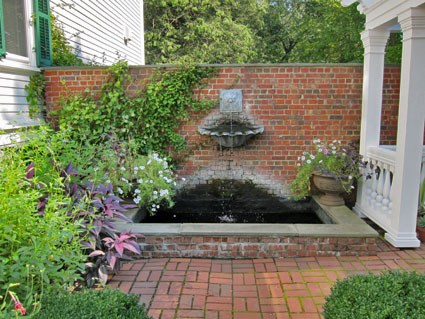 |
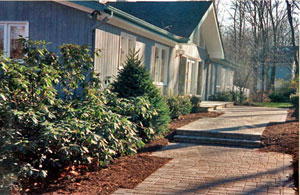 |
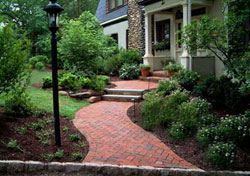 |
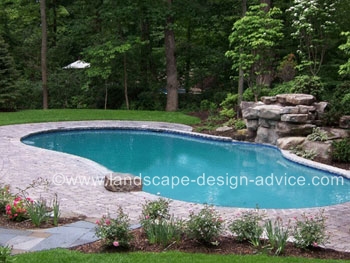 |
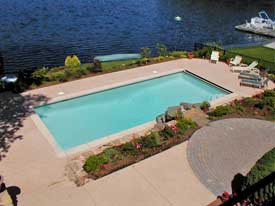 |
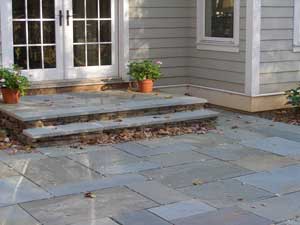 |
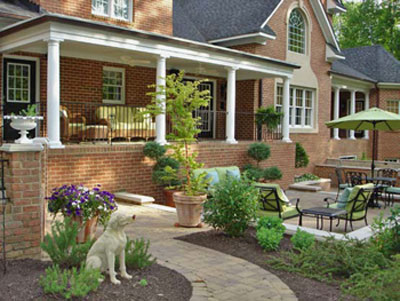 |
More Help With Susan's Ebooks
If you enjoyed this page, please share it!
Return From Landscaping With Stone to Landscape Design Advice Home
